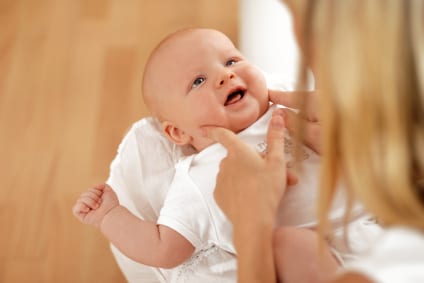 If your baby is nearly six months old, cuddling and caressing is the best, new thing in town! She wants to touch and caress your skin – usually your face – and understands that you like it and also learns a lot from doing it. In doing so, she realizes that it gives you a "special" feeling.
If your baby is nearly six months old, cuddling and caressing is the best, new thing in town! She wants to touch and caress your skin – usually your face – and understands that you like it and also learns a lot from doing it. In doing so, she realizes that it gives you a "special" feeling.
But, once in a while, she may suddenly "hit" you. While you will undoubtedly be surprised, it is very important that you realize that she is not doing it on purpose. The fact of the matter is, quite simply, that she has barely started to be able to perceive and control distances with her new leap into the "world of relationships" and she still has difficulty in anticipating and judging proper distances. All she knows for sure is that she wants to (literally) feel mommy right away and sometimes she gets a little too enthusiastic.
So, what do you do? First, if you say "careful" softly and show in your facial expression that it hurts a little, she will quickly learn to be tender. After all, all she watns to do is show you that she loves you in very much the same, loving way that you show her.
Here are 5 tips to help handle your little one’s sometimes overly enthusiastic expressions of love:
- Never hit back. Your baby does not learn anything from a "corrective" slap or a "good smack on the bottom." More importantly, hitting a baby is absolutely unacceptable, even when it is "only" a a correcting slap on the hand. It unnecessarily hurts your baby and damages the trust your baby has in you. Hurting your baby or child is never a good way to teach the rules. Your child does what you do. If she cannot hit you, then you should not hit her. In other words, if you hit your child, then it really does not make any sense (especially in her young world) in saying that she shouldn’t hit. Your words must match your actions.
- Learned young, old done. In other words, if the child is not "corrected" (in this case, about hitting) then they think it is acceptable and the older they get, the harder is it to change the behavior. Of course, with every leap in mental development, your baby is able to understand more complex things. And, it is only after the leap into the world of systems (@ 18 months), that your toddler becomes less egocentric and can put herself in someone else’s shoes. But, that doesn’t mean you should wait until that age to teach your baby that hitting hurts you. You can do that in a very simple way; around the six-month mark, your baby has just entered the "world of relationships" and has risen one level above the "world of events." What does this mean? It means that she is able to choose and vary events at will for the very first time. For instance, events with the hand are stroking, caressing, touching, poking, slapping and punching. So, all you have to do is give your baby feedback on what you like and what you don’t. "But how?," you ask…
- Show it. Very simple: show it in your facial expressions, your tone of voice and your body language. As long as your baby is stroking your cheek, or caressing your face and touching you softly, then say something like "ahhh," in a soft voice and with a smile on your face. When the touching becomes harder and turns into poking or pulling, you don’t smile anymore and you may say "oh?" in a questioning tone while raising your eyebrows, And, when the poking turns into slapping or hitting, you say "ouch!" in a louder tone of voice while you move your head away.
- Make a game of it. Together with your baby, make this a game you play with one of her dolls or cuddly toys. This way, she learns the rules, but also you avoid putting blame on her. Again, she is just learning!
- Repeat offender. At first, your baby may repeat poking or hitting you. This is normal. Babies learn by endless repetition. So, be patient at first and repeat points 3 and 4. That said, at some point, enough is enough and you will have to make it abundantly clear that is it not nice and you don’t like it. Do so by raising your tone of voice even more so when saying "ouch!" If your baby continues to repeat the behavior, then distance yourself from her and ignore her for a little while… Of course, secretly you are keeping your eye on her to prevent any mishaps.





